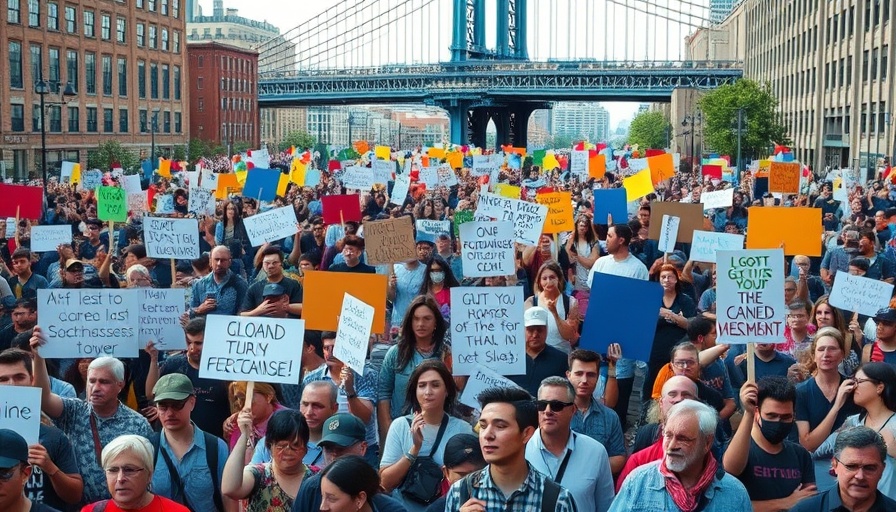
Los Angeles County's Bold Move Against ICE Raids
In a significant move underscored by rising tensions, Los Angeles County is considering a state of emergency declaration aimed at combatting the financial and social implications of ongoing Immigration and Customs Enforcement (ICE) raids. The proposal, presented by county supervisors, would empower local officials to create an eviction moratorium and provide vital protections for immigrant families greatly affected by these federal actions. The board's decision comes in response to what many are calling a humanitarian crisis exacerbated by immigration policies seen as draconian.
Fear and Uncertainty: The Impact of ICE Raids on Communities
County Supervisor Lindsey Horvath has been outspoken about the ever-present fear among immigrant communities, noting that anxiety has permeated daily life and caused profound economic harm. “Families are now afraid to go to work, to attend school or even to buy groceries,” she indicated. This fear not only threatens individual well-being but risks destabilizing entire neighborhoods, creating a ripple effect felt across the local economy.
Research suggests that the impact of mass deportations stretches beyond immediate families, affecting numerous local businesses due to decreased consumer spending. A recent study from UC Merced highlighted a potential cost of $275 billion to California's economy if the undocumented workforce were decimated, illustrating the broader implications of these actions.
The Legal Minefield of An Eviction Moratorium
The proposed eviction moratorium, while designed to shield vulnerable tenants, raises complex legal questions, which were highlighted by county attorneys. Critics argue that this could inadvertently lead to the revelation of immigrants' legal statuses should they challenge eviction notices in court. “This puts an already vulnerable population at greater risk,” cautioned Janice Hahn, another county supervisor supportive of the emergent protections.
Board Chair Kathryn Barger voiced her dissent regarding the declaration, arguing that labeling the situation as an emergency could invite significant legal repercussions, not only from landlords but potentially from state-level challenges. “I do worry about the implications for landlords, especially when they are faced with a moratorium and still need to pay their bills,” she stated.
Drawing Parallels with Past Responses to Humanitarian Crises
Historically, states of emergency have been declared during significant natural disasters, but the current board argues that the socio-economic fallout from ongoing ICE operations warrants similar action. Instances in other cities, such as Chicago and Portland, have shown a pattern of escalating enforcement that may soon reach Los Angeles County. Supervisor Horvath pointed to these examples as evidence of an impending crisis, emphasizing the urgent need for preemptive measures.
Understanding the Broader Implications: Community and Local Economy
The stakes are high not only for the families directly impacted by ICE but for the local economy as well. The ripple effect from an ongoing series of immigration raids could hinder the productivity of vital sectors where immigrant workers are essential. Economic fears due to uncertain immigration status might also discourage individuals from seeking employment or enhancing their skills through education. This, in turn, holds the potential to damage social cohesion and the vibrancy of local communities.
Conclusion: The Call for Collective Action and Solidarity
As the Los Angeles County Board of Supervisors prepares to vote on the emergency declaration, the community watches closely. This unfolding scenario underscores not only the tensions surrounding immigration policy at a federal level but also the urgent need for solidarity among residents and local officials alike. With the potential for litigation looming, the decision taken on October 14 will represent a defining moment for Los Angeles County.
Every individual affected has a stories that deserves to be acknowledged. Forward-thinking communities must engage in conversations around immigration and economic health, advocating for measures that prioritize the welfare of all residents, regardless of their legal status.
 Add Row
Add Row  Add
Add 




Write A Comment